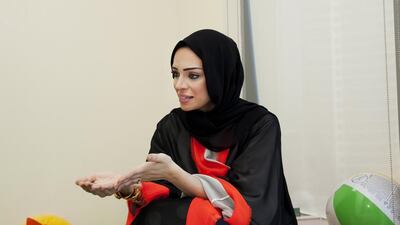DUBAI // Identifying early signs of learning disability can change young lives, but only if the right help is available, experts say.
Parents need support and advice on how to tell if their child has a problem and how to accept it, said Linda Yazigi, co-founder of the Brio Centre, an early learning consultancy in Business Bay.
“There has been a stigma before but things are changing in Dubai,” said Ms Yazigi, whose son was 6 when his learning disability was diagnosed.
“It is a lot of work for parents and schools to accept these children and work as a team. My son had all the help he needed because I could recognise the signs.
“When he was very young, he was not looking at me and there was a delay in his speech development.
“He was the youngest of my three sons so I knew where his level of development should be for a boy his age. It is harder for parents when it is their first child.”
Research shows early detection is important because 85 per cent of brain development occurs before the age of 5.
Learning difficulties can include reading dyslexia and mathematics or writing disability.
Randa Al Hemeiri, the Emirati owner of Brio Centre, said the biggest challenge was changing people’s perceptions.
“A lot of people think it is abusive to identify their child with a learning difficulty,” Ms Al Hemeiri said. “People are scared and don’t understand it, so they can be offended.
“We need to change the culture before we can reach the point of building on that.”
A 2011 study published by UAE University in Al Ain showed 459 of 2,500 Emirati university students displayed symptoms consistent with dyslexia.
The availability of treatment for very young children with learning difficulties is rare. Children with autism spectrum disorders can get treatment at the Sharjah Autism Centre, but only after the age of 5.
During school age, special education programmes and shadow teachers monitor pupils’ development to ensure they received necessary help in class.
Since 2013, more than 265 parents and teachers have graduated from Al Jalila Foundation’s Ta’alouf programme, helping carers of children with special needs to learn new skills to further their development.
Ras Al Khaimah Hospital open-ed the first paediatric rehabilitation centre in the emirate this year, and is one of the few mainstream hospitals offering the service.
It provides physical, occupational and speech therapy for children with developmental disabilities.
Dr Raza Siddiqui, executive director of RAK Hospital, said every child deserved an equal chance in life.
“Our services cater to children who require support in speech, cognitive learning and developmental growth,” Dr Siddiqui said.
Experts say problems can be caused by a cerebral trauma or hereditary conditions that cause difficulty with a child’s nervous system in processing and communicating information.
Nathalie Jamous, a special educator from Lebanon working with young children, has been teaching in Dubai for seven years and said early intervention often provided a better outcome.
“If you have a child who is 3 and has a language development issue, it is better to take action immediately rather than wait for a second diagnosis,” Ms Jamous said.
“After the age of 6, you will have more input to compensate.”
nwebster@thenational.ae


